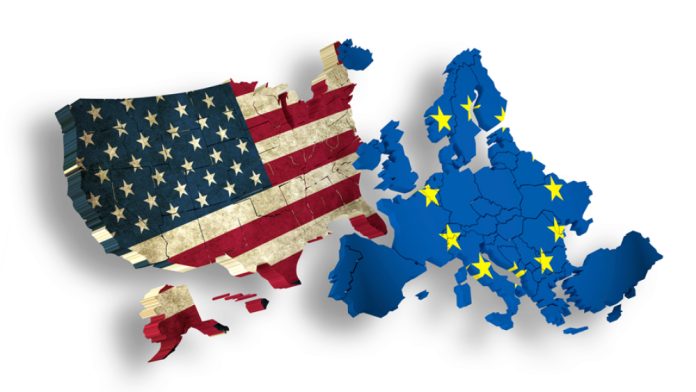Europe is facing dramatic change, and its implications for America’s relations with key allies haven’t yet to be fixed in Washington, POLITICO reports.
Under pressure from France and Germany, the EU is rapidly moving towards the most significant systemic transformation in its entire existence. Any day now there will be a centralisation of power that will change the very nature of the bloc, affecting the politics and economy of the continent. It will also fundamentally alter Europe’s interaction with the US.
The coming changes will transform the EU from a union of sovereign countries into a single federation with a central government running partially self-governing nation-states. The key argument of proponents of this idea is that without it, the planned enlargement of the bloc will soon make it ungovernable.
The proposed treaty revision is based on three fundamental changes:
- limiting the number of EU commissioners,
- introducing majority voting
- abolishing the veto power of individual member states, which would end the principle of unanimity.
If these changes come into effect, power in the EU will be redistributed dramatically, centred in Berlin and Paris, as the largest countries would essentially be able to impose their will on the entire bloc. The proposed changes are comparable in scale to the elimination of the electoral college in the United States and the transition to simple majority voting, which would effectively allow the largest states to freely determine the country’s policy.
And while the US is not yet aware of the impending changes, a treaty renegotiation process is already underway in Europe, involving fundamental changes in 10 key areas, including EU foreign, security and defence policy. And as a concrete step towards such changes, a report by the Constitutional Affairs Committee that will be the European Parliament’s contribution to the treaty renegotiation convention was recently approved, which went largely unnoticed by the US media. Next, all MEPs must vote on the report in plenary this week.
However, the administration of US President Joe Biden has been rather indifferent to these changes. Perhaps the states believe that a more united EU will become a more effective partner, with Berlin and Paris (via Brussels) becoming Washington’s main interlocutors. And given that Germany is the largest and most dominant country in Europe after the UK’s Brexit, at first glance this policy seems like the obvious default position, according to POLITICO.
If American advocates of further EU centralisation are fond of repeating the famous remark, “Who do I call if I want to talk to Europe?” – a question often erroneously attributed to former Secretary of State Henry Kissinger, the forthcoming reality of Europe is not in line with how the administration of then-President Richard Nixon interacted with the continent at the time.
This view of EU federalism overlooks the fact that, above all, its national interests should drive America’s European policy, and the US should construct some form of institutional framework according to its own preferences.
Germany’s and France’s positions on key foreign and security policy issues diverge from those of the United States, so the idea that a “federalised” Europe will be easier for the United States to deal with is not supported by any facts – especially those guiding the Berlin-Paris tandem. And as in any alliance, the US should favour those countries whose threat perceptions and national interests are closest to its own.
Here, recent US efforts to assist Ukraine should serve as a guide to the countries Washington should reach out to in Europe. Since the beginning of the war in Ukraine, it has been the countries on NATO’s eastern flank – from Finland to the Baltic states, Poland and Romania – that have shown the greatest resolve to stand with the United States in support of Ukraine, while Germany and France have followed suit reluctantly and more often than not failed to honour their commitments, POLITICO reports.
And now, as the US continues to push its European allies to move forward with rearmament and the necessary capabilities to implement NATO’s three new regional plans, it is these flanking countries that are once again taking the lead.
France directs its spending to project power in the Mediterranean and beyond, Germany has failed to meet even the agreed minimum defence spending target of 2% of GDP. Thus, the notion that a federalised Europe led by Berlin and Paris will respond more, rather than less, to US requests for meaningful contributions to deterrence and defence is wishful thinking.
The US should pay more attention to the unfolding political transformation of the EU. The proposed changes to the EU treaties raise fundamental questions about how the US intends to lead NATO in the future and how it can best use the commonality of interests on the continent to reduce the security burden across the Atlantic.
Of course, only Europeans and Europe itself should decide on its future. However, the US, as the key security provider on the continent, should not be left behind – especially when that choice will affect the burden of collective defence in NATO.
